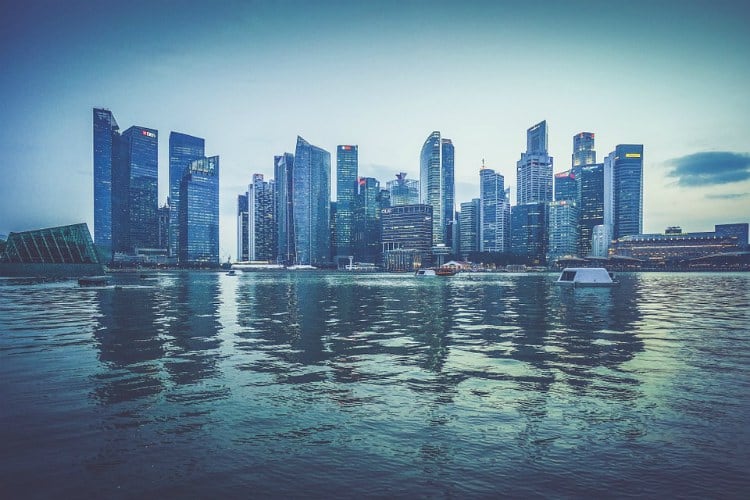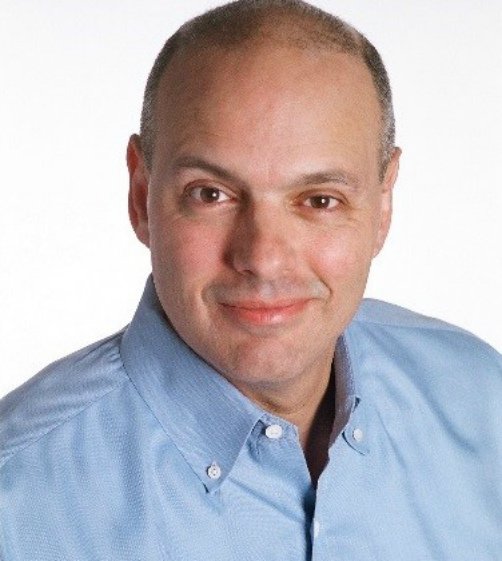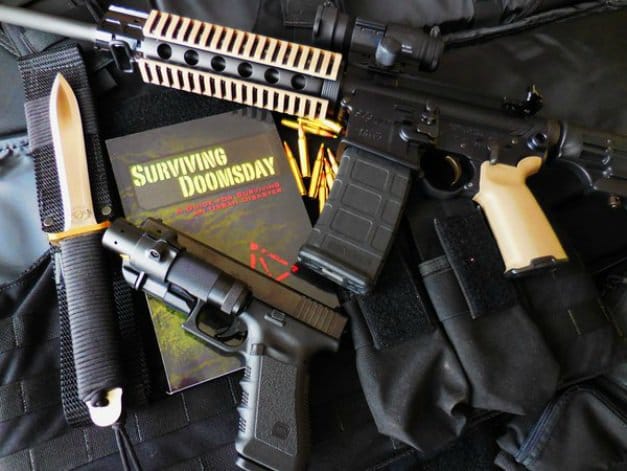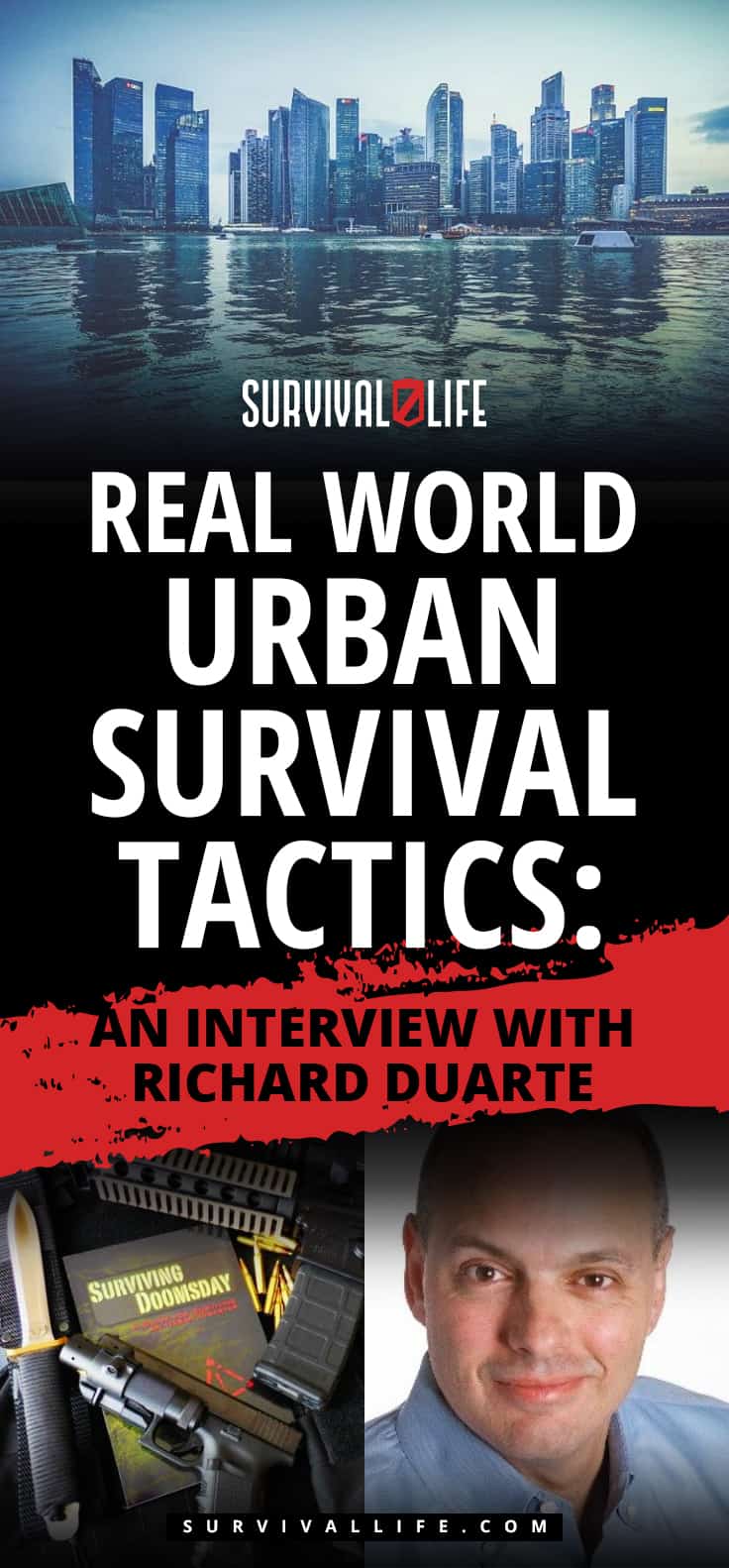Evacuation Planning
Real World Urban Survival Tactics: An Interview With Richard Duarte

Not every survival situation ends up out in the wild… Sometimes it’s the concrete jungle (urban survival) that you’re forced to contend with. That situation calls for a different type of preparation.
Richard Duarte doesn’t fit the prepper or survivalist stereotype the mainstream media and many movies love to perpetuate. Not many of us do! He is a highly-educated professional who slips into a suit and tie and ventures out into the real world on a daily basis. At the same time, he fully understands the dangers, both man-made and natural, which are looming around the next corner. In fact, in many ways Richard Duarte is just like all the rest of us who are focused on preparedness!
At the same time, he fully understands the dangers, both man-made and natural, which are looming around the next corner. In fact, in many ways, Richard Duarte is just like all the rest of us who are focused on preparedness!

Richard Duarte is a practicing attorney in South Florida who was inspired to adopt the preparedness lifestyle after surviving Hurricane Andrew in August 1992. He consults, writes and lectures on urban survival and disaster planning. Duarte is also a big firearms enthusiast and a strong proponent of the Second Amendment. His books include Surviving Doomsday – A Guide for Surviving an Urban Disaster, The Quick Start Guide for Urban Survival.
What was the motivation for the Quick Start Guide for Urban Survival?
To answer this question I need to back up a bit. In 2012, I wrote Surviving Doomsday – A Guide for Surviving an Urban Disaster. I purposely kept the book short, 180 pages, and devoted a chapter to each of the survival basics.
Over the next two years, people kept telling me that they really wanted to get prepared, but they just didn’t have the time to sit and “do a lot of reading.” Initially, I was frustrated by this. My primary goal is to reach as many people as possible and to help get them prepared. However, I also understand that people are busier than ever.
One day, it occurred to me that just about every product we buy comes with an owner’s manual and a quick start guide, since few people actually have the time (or desire) to read the manual. This got me thinking: what about a quick start guide for preparedness? I began working on it the very next day. The Quick Start Guide (QSG) is compact and to-the-point. It contains everything people need to get started with their preparations — and nothing they don’t. It’s easy to read and follow, but it’s jam-packed with all the necessary information. It also includes lots of color photos, illustrations, diagrams, lists and detailed shopping lists in each chapter. It’s an illustrated road-map of sorts to make the preparedness journey a whole lot easier.
Many people actually end up getting both books. Surviving Doomsday contains a lot more detail and substance, and the QSG allows readers to access all sorts of useful information quickly and easily. The QSG also serves as quick reference guide. Now there’s absolutely no excuse for anyone not to be prepared!
What got you interested in prepping?
In the early 1990s the term “prepping” didn’t even exist. After my close-call with Hurricane Andrew, I started doing a great deal of research and reading any survival books I could find. Eventually, I came across some good material, but I also found a lot of information and advice that just wasn’t very practical or realistic for urban dwellers. Back then, much of the focus was on wilderness survival, and threat-specific preparations. The wilderness advice missed the mark for urban dwellers. The threat-specific approach that was too narrowly focused to be truly effective. I knew that there had to be a better way. I also knew that I wanted to focus my efforts where I could get the highest return for my prepping investment of time and money.
It was around this time that I started to formulate what I would later call the Core Survival Elements (CSE) – Food, water, first aid, sanitation/hygiene, security/self-defense, knowing when to stay put (bug-in), and when to get out (bug-out). These are the things that will help keep you alive no matter what calamity comes your way, natural or man-made. For many people this was the first time they could actually start to focus on the survival basics for the urban environment.
Why did you become passionate about sharing your preparedness knowledge and advice with others?
Initially, I never intended to write books on preparedness, or any other topic for that matter. That came much later. My early efforts were focused on putting together some preliminary notes to help my close friends and relatives start making basic preparations. It pained me to see just how unprepared many of them were.
In them, I saw a piece of me years before. I had gotten hammered so hard by Hurricane Andrew, and I didn’t want to see something like that happen to any of them. Those early notes eventually turned into Surviving Doomsday and subsequently the QSG. If my writings help even just one person to avoid the hardship that we lived through, it will have been well worth all the effort.
To what degree does where a family chooses to live factor into their preparedness plan?
Where a person lives drives much of what they do and how they will do it. The vast majority of the population of the United States lives in densely populated urban centers. This can be a big problem when a crisis strikes. Large cities are home to some of the largest and most sophisticated banking and commercial centers the world has ever known. These industries drive a large portion of our economy, employment, and growth. All this tends to create jobs and opportunities, which in turn attracts lots of people.
These densely packed concrete jungles are also home to millions of full-time residents. These folks consume vast quantities of food, water, electricity and other goods; all of which must be trucked in every day to satisfy the almost endless demand. It all seems to work out just fine, until it doesn’t. During a disaster or public emergency, large cities are usually the first to feel the severe pain when the electricity and water stops flowing, and the consumables stop arriving.
Even a short interruption in this vital supply chain can be devastating if people aren’t prepared. For this, and many other reasons, people who live, work and play in urban areas need to have supplies, skills and a plan, or plans, for short and long-term survival. Accepting this reality is the first step in protecting yourself, and being prepared.
Even Richard Duarte must have prepping fails. What have you learned?
My biggest all-time fail was getting caught asleep at the wheel during Hurricane Andrew — we walked out the morning after with nothing more than the clothes on our backs. In those very difficult months that followed, I realized just how lucky we were to be alive. I promised myself that I would never allow anything like that to happen again.
Over the years, however, I have tried many different approaches to preparedness and I made many mistakes along the way. Preparedness is a process of trial and error. Finding out what works for you and your family isn’t always fast or easy; but it’s so worth the time and the effort.
What should people concentrate on when trying to figure out what works?
Preparation & planning for the basics (water, food, 1st aid/medical, security/self-defense, sanitation/hygiene, and knowing when to get out, and when to stay put). Many people totally neglect the basics.
Folks also vastly underestimate the risks, and overestimate their abilities. They just don’t realize how quickly the average person can become dehydrated; or how important basic security/self-defense is during a disaster. Many people also overthink their planning and end up doing nothing. Preparedness is a lifestyle, and each person’s plans and preparations should evolve with their changing needs and circumstances.
Surviving Doomsday and the QSG both encourage the reader to think for themselves. The books provide the survival basics and the framework. Then they guide the reader to customize their plan and preparations to their particular set of circumstances. No two plans will ever be the same, because none of us are exactly the same. We show readers how to get started to find what works for them and their family.
If you could go back and add one more bit of information about urban survival to the book, what would it be?
Anytime I write anything I always have to fight the temptation to keep going back and adding additional information. At some point you just have to let go. If I could, I would add more on the type of gear folks should consider having and specific recommendations. I would also go into more advanced preparedness skills, mindset, and planning strategies. I am actually working on a third book, and these are some of the topics I will be including.
As I said earlier, your preparations and plans must evolve and improve over time. Once you have addressed the survival basics, it’s usually time to start working on more advanced skills, plans, and preparations.
What three patented “urban Survival” tips would you give to newbie preppers?
Just dive in and get started. The sooner you get started, the sooner you will start to realize what is practical, reasonable and realistic for your circumstances. Remember, just because something works for some self-professed survival expert doesn’t mean it will work for you and your family. Focus on the survival basics, formulate a plan, test your plan and your preparations under real-world conditions, and then use your findings and insights to improve your plans and your preps. Preparedness is a lifestyle.
An untested plan is about as good as having no plan at all. It could even be worse, since having this plan might lure you into a false sense of confidence. Give yourself room to improve your preparations over time and test everything before you place your trust on it.
Forget the fantasy. A disaster and the resulting chaos always looks very different than anything you might imagine, or what you routinely see on TV. Never forget that fiction is meant to be entertaining. You must plan for the real world.
If people want to find Richard Duarte, where should they look?
I have had to scale back on appearances at shows and expos due to time constraints. But, I have been busy writing for a number of publications including Recoil/OffGrid and S.W.A.T. Magazine. I also post a lot of content on my blog Quick Start Survival and on other social media.
Many of my magazine articles also appear on my blog and are available for free to my readers courtesy of the folks at S.W.A.T and Recoil/OffGrid. I may pop-up at some shows later in 2017 but I’ll make sure to post those events in advance at QuickStartSurvival.com. And lastly, readers should keep an eye out for my third book in early 2018. No spoilers at this point, but it will pick up where Surviving Doomsday and the QSG left off.
Do you agree with Richard Duarte and his tips for prepping? Let us know in the comments below!
If Richard Duarte and his story of Hurricane Andrew seemed familiar, read our Hurricane Survival Tips and stay prepared!

-

 Do It Yourself7 months ago
Do It Yourself7 months agoParacord Projects | 36 Cool Paracord Ideas For Your Paracord Survival Projects
-

 Do It Yourself9 months ago
Do It Yourself9 months agoHow To Make Paracord Survival Bracelets | DIY Survival Prepping
-

 Do It Yourself9 months ago
Do It Yourself9 months ago21 Home Remedies For Toothache Pain Relief
-

 Do It Yourself10 months ago
Do It Yourself10 months agoSurvival DIY: How To Melt Aluminum Cans For Casting
-

 Exports8 months ago
Exports8 months agoAre Switchblades Legal? Knife Laws By State


Pingback: Real World Urban Survival Tactics: An Interview With Richard Duarte – Survive The Outdoors
Pingback: What Is Urban Survival Syndrome? | Primitive technology
Pingback: 11 Underrated Survival Skills You Should Know in the Urban Area – The Self-Sufficient Life
Pingback: 11 Underrated Survival Skills You Should Know in the Urban Area – surviveurself
Pingback: 11 Underrated Survival Skills You Should Know in the Urban Area – SurvivalHood
Pingback: 11 Underrated City Survival Skills You Should Know in the Urban Area – The Self-Sufficient Life
Pingback: 11 Underrated City Survival Skills You Should Know in the Urban Area – surviveurself
Pingback: 11 Underrated City Survival Skills You Should Know in the Urban Area – SurvivalCove.com